Brake Pressure Modulator Valve Replacement Without RPO LAT
Removal Procedure
Caution: Refer to Brake Fluid Irritant Caution in the Preface section.
Notice: Refer to Brake Fluid Effects on Paint and Electrical Components Notice in the Preface section.
Notice: Always connect or disconnect the wiring harness connector from the EBCM/EBTCM with the ignition switch in the OFF position. Failure to observe this precaution could result in damage to the EBCM/EBTCM.
- Turn the ignition switch to the OFF position.
- Remove the underhood electrical center. Refer to Underhood Electrical Center or Junction Block Replacement.
- Without draining the coolant or removing the hoses, remove and position aside the radiator surge tank. Refer to Radiator Surge Tank Replacement.
- Disconnect the electronic brake control module (EBCM) electrical connector by lifting the locking tabs.
- Disconnect the LF brake pipe fitting (1) at the brake pressure modulator valve (BPMV).
- Disconnect the RF brake pipe fitting (2) from the BPMV.
- Disconnect the master cylinder primary brake pipe fitting (1) from the BPMV.
- Disconnect the master cylinder secondary brake pipe fitting (2) from the BPMV.
- Disconnect the LR brake pipe fitting (1) from the BPMV.
- Disconnect the RR brake pipe fitting (2) from the BPMV.
- Remove the BPMV bolt (1).
- Carefully remove the BPMV assembly (1) by pulling straight upward.
- Inspect the insulators for damage and replace, if necessary.
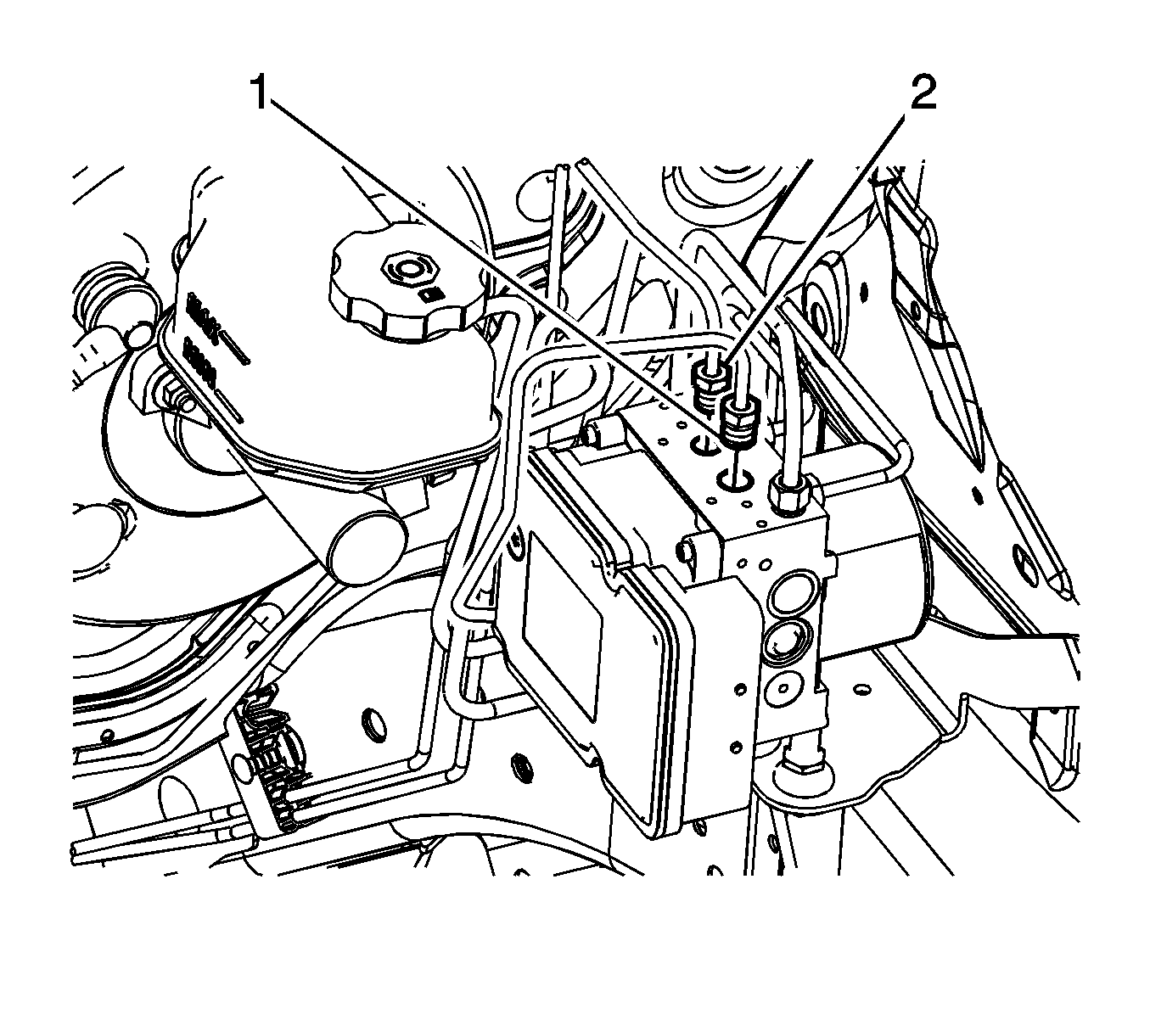
Cap the brake pipe fitting and plug the BPMV outlet port to prevent brake fluid loss and contamination.
Cap the brake pipe fitting and plug the BPMV outlet port to prevent brake fluid loss and contamination.
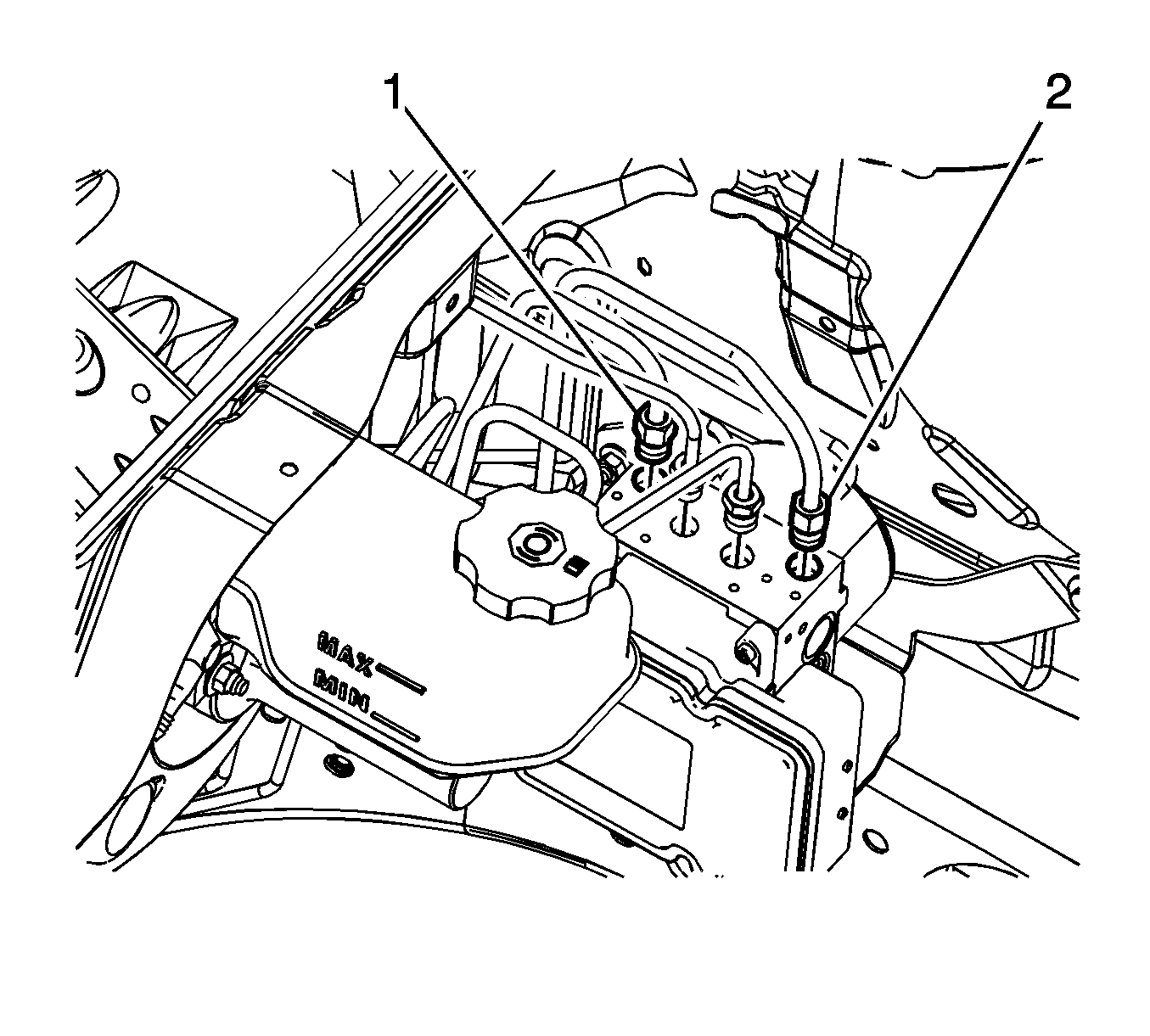
Cap the brake pipe fitting and plug the BPMV inlet port to prevent brake fluid loss and contamination.
Cap the brake pipe fitting and plug the BPMV inlet port to prevent brake fluid loss and contamination.
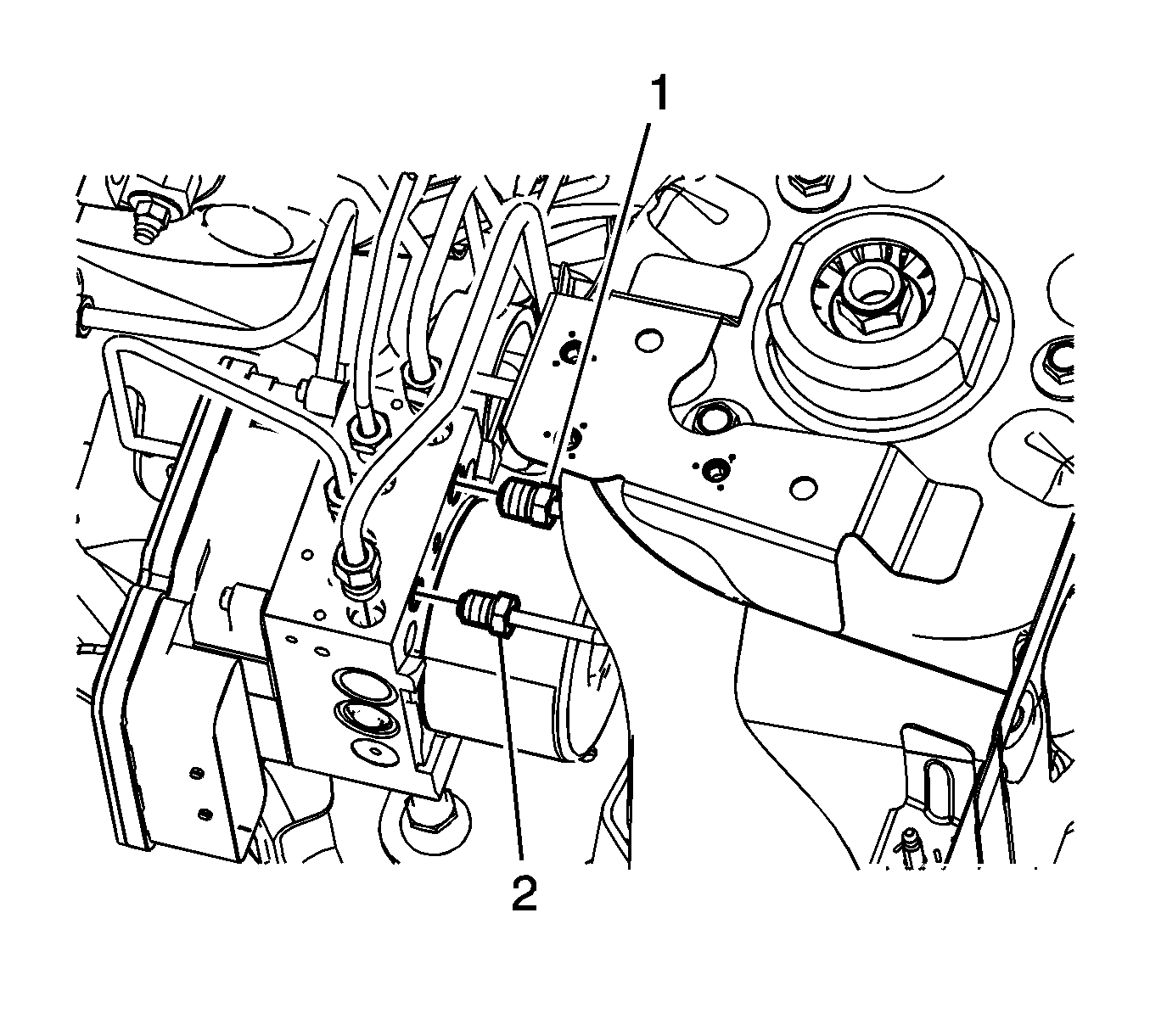
Cap the brake pipe fitting and plug the BPMV outlet port to prevent brake fluid loss and contamination.
Cap the brake pipe fitting and plug the BPMV outlet port to prevent brake fluid loss and contamination.
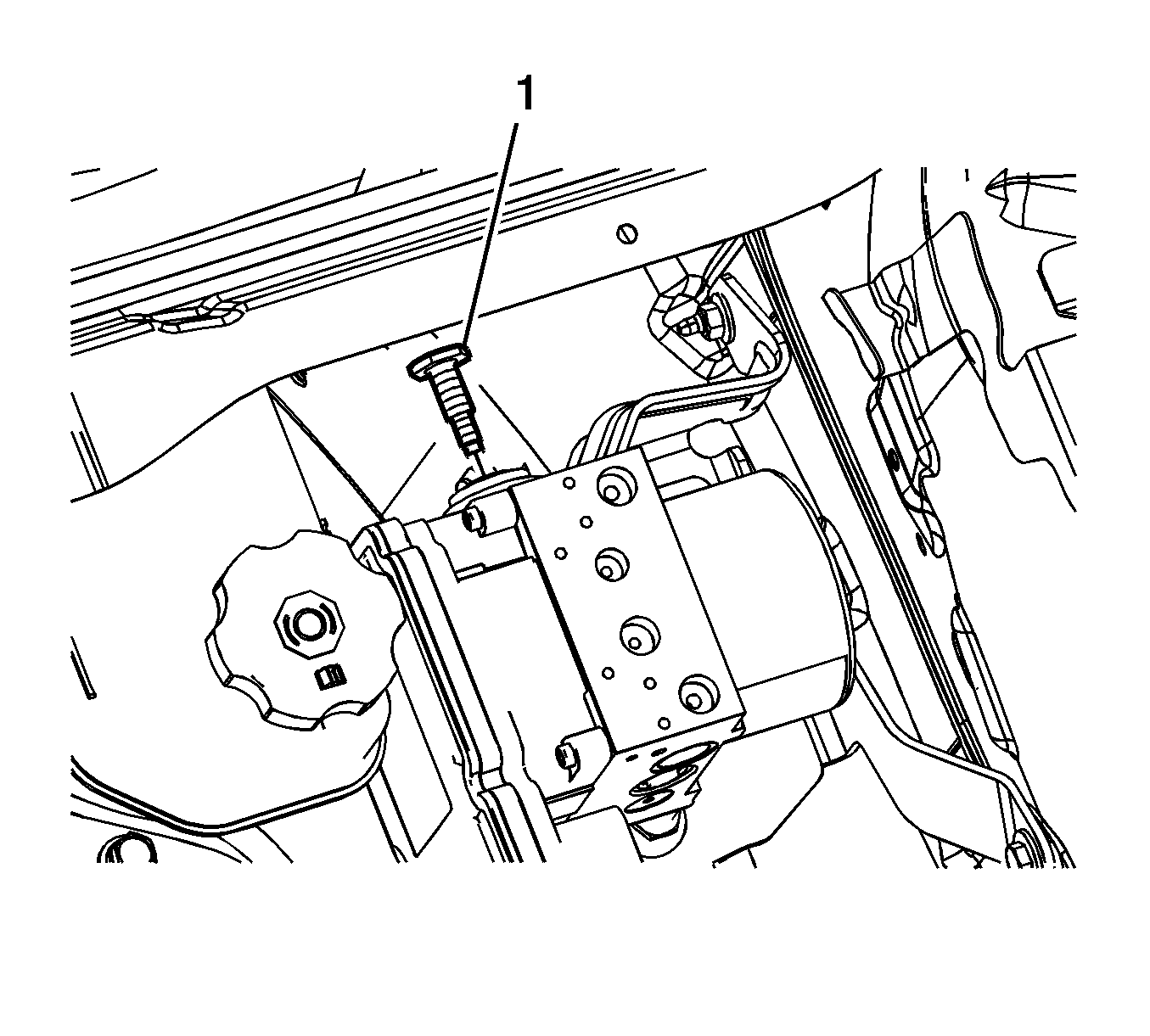
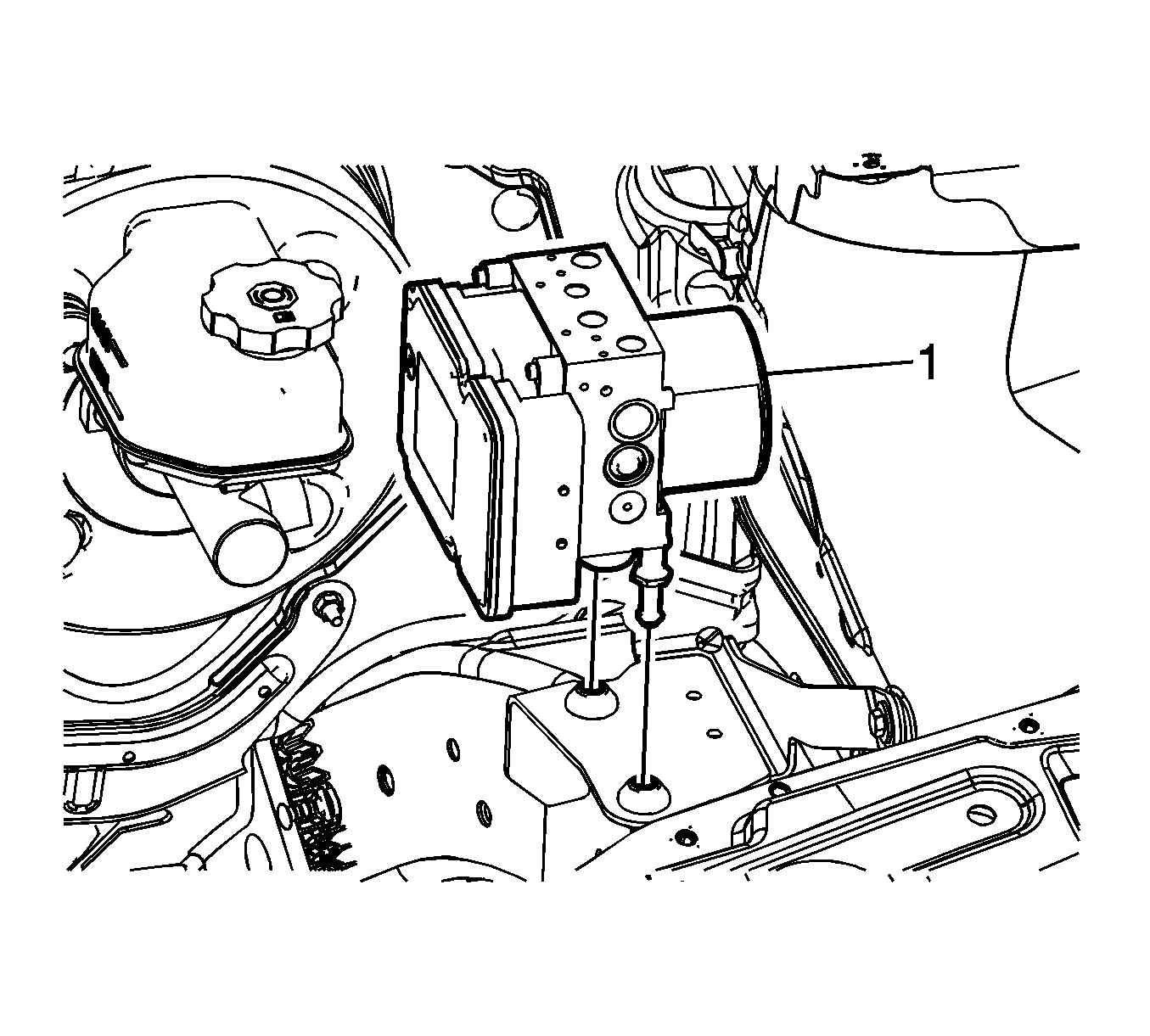
Do not pry on the accumulator caps on the underside of the BPMV.
Installation Procedure
- Install the BPMV assembly (1) to the bracket.
- Install the BPMV bolt (1).
- Connect the LR brake pipe fitting (1) to the BPMV.
- Connect the RR brake pipe fitting (2) to the BPMV.
- Connect the master cylinder primary brake pipe fitting (1) to the BPMV.
- Connect the master cylinder secondary brake pipe fitting (2) to the BPMV.
- Connect the LF brake pipe fitting (1) to the BPMV.
- Connect the RF brake pipe fitting (2) to the BPMV.
- Connect the EBCM electrical connector.
- Install the radiator surge tank. Refer to Radiator Surge Tank Replacement.
- Install the underhood electrical center. Refer to Underhood Electrical Center or Junction Block Replacement.
- Bleed the hydraulic brake system. Refer to Hydraulic Brake System Bleeding.
- Turn the ignition switch to the ON position.
- Perform the Diagnostic System Check - Vehicle.
- Observe the brake pedal feel after performing the diagnostic system check. If the pedal now feels spongy, air may have been in, or may have been introduced into the primary circuit.

Notice: Refer to Fastener Notice in the Preface section.

Tighten
Tighten the bolt to 10 N·m (89 lb in).

Tighten
Tighten the fitting to 21 N·m (16 lb ft).
Tighten
Tighten the fitting to 21 N·m (16 lb ft).

Tighten
Tighten the fitting to 21 N·m (16 lb ft).
Tighten
Tighten the fitting to 21 N·m (16 lb ft).

Tighten
Tighten the fitting to 21 N·m (16 lb ft).
Tighten
Tighten the fitting to 21 N·m (16 lb ft).
If the pedal feels spongy, perform the Antilock Brake System Automated Bleed Procedure.
Brake Pressure Modulator Valve Replacement With RPO LAT
Removal Procedure
Caution: Refer to Brake Fluid Irritant Caution in the Preface section.
Notice: Refer to Brake Fluid Effects on Paint and Electrical Components Notice in the Preface section.
Notice: Always connect or disconnect the wiring harness connector from the EBCM/EBTCM with the ignition switch in the OFF position. Failure to observe this precaution could result in damage to the EBCM/EBTCM.
- Turn the ignition switch to the OFF position.
- Remove the battery. Refer to Battery Replacement.
- Without draining the coolant or removing the hoses, remove and position aside the radiator surge tank. Refer to Radiator Surge Tank Replacement.
- Disconnect the electronic brake control module (EBCM) electrical connector by lifting the locking tabs.
- Disconnect the LF brake pipe fitting (1) at the brake pressure modulator valve (BPMV).
- Disconnect the RF brake pipe fitting (2) from the BPMV.
- Disconnect the master cylinder primary brake pipe fitting (1) from the BPMV.
- Disconnect the master cylinder secondary brake pipe fitting (2) from the BPMV.
- Disconnect the LR brake pipe fitting (1) from the BPMV.
- Disconnect the RR brake pipe fitting (2) from the BPMV.
- Raise and support the vehicle. Refer to Lifting and Jacking the Vehicle.
- Remove the BPMV bracket bolts (1).
- Position the BPMV and bracket assembly to access the BPMV bolt.
- Remove the BPMV bolt (1).
- Carefully remove the BPMV assembly (1) by pulling straight upward.
- Inspect the insulators for damage and replace, if necessary.

Cap the brake pipe fitting and plug the BPMV outlet port to prevent brake fluid loss and contamination.
Cap the brake pipe fitting and plug the BPMV outlet port to prevent brake fluid loss and contamination.

Cap the brake pipe fitting and plug the BPMV inlet port to prevent brake fluid loss and contamination.
Cap the brake pipe fitting and plug the BPMV inlet port to prevent brake fluid loss and contamination.

Cap the brake pipe fitting and plug the BPMV outlet port to prevent brake fluid loss and contamination.
Cap the brake pipe fitting and plug the BPMV outlet port to prevent brake fluid loss and contamination.
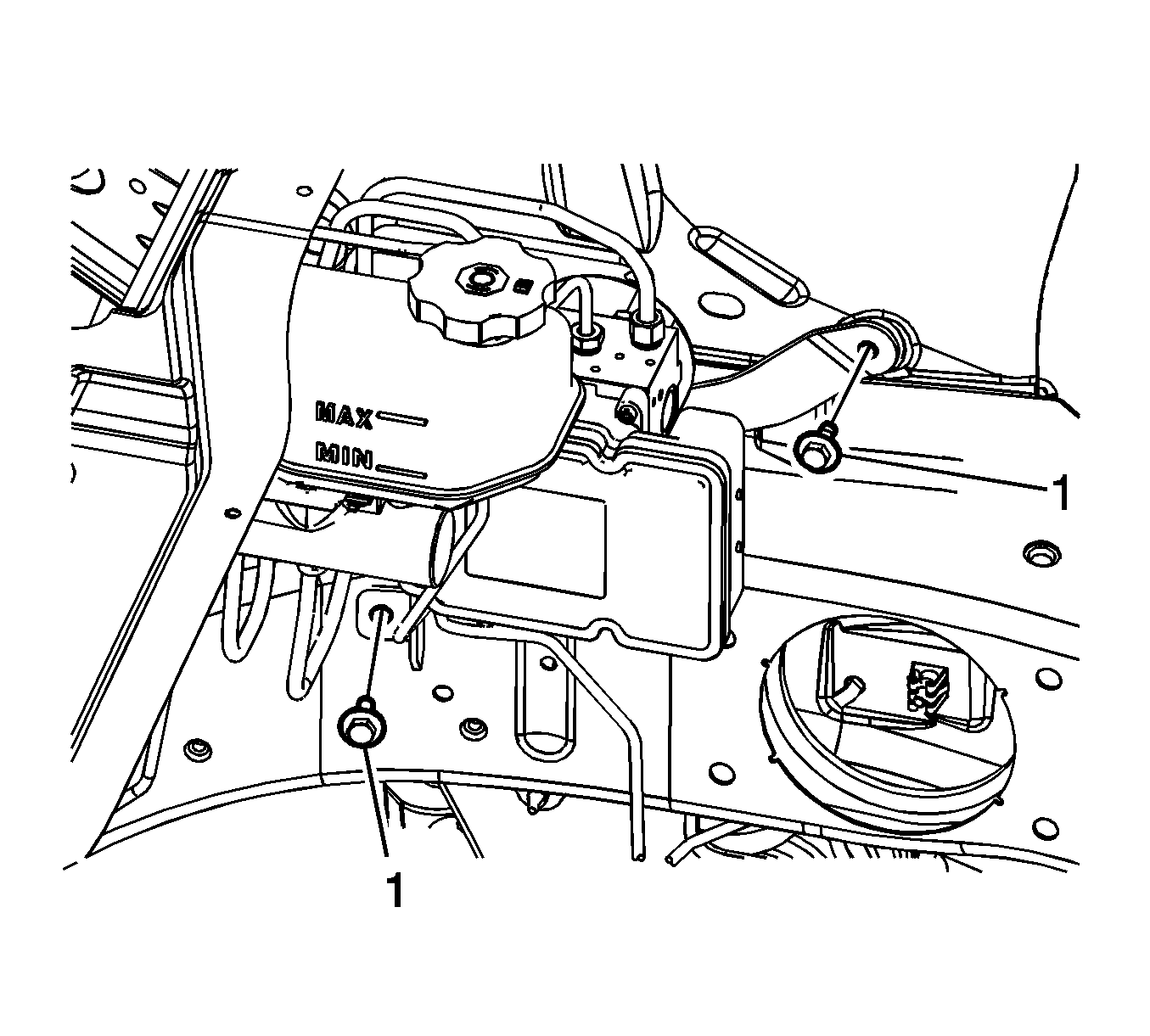


Do not pry on the accumulator caps on the underside of the BPMV.
Installation Procedure
- Install the BPMV assembly (1) to the bracket.
- Install the BPMV bolt (1).
- Install the BPMV bracket bolts (1).
- Lower the vehicle.
- Connect the LR brake pipe fitting (1) to the BPMV.
- Connect the RR brake pipe fitting (2) to the BPMV.
- Connect the master cylinder primary brake pipe fitting (1) to the BPMV.
- Connect the master cylinder secondary brake pipe fitting (2) to the BPMV.
- Connect the LF brake pipe fitting (1) to the BPMV.
- Connect the RF brake pipe fitting (2) to the BPMV.
- Connect the EBCM electrical connector.
- Install the radiator surge tank. Refer to Radiator Surge Tank Replacement.
- Install the battery. Refer to Battery Replacement.
- Bleed the hydraulic brake system. Refer to Hydraulic Brake System Bleeding.
- Turn the ignition switch to the ON position.
- Perform the Diagnostic System Check - Vehicle.
- Observe the brake pedal feel after performing the diagnostic system check. If the pedal now feels spongy, air may have been in, or may have been introduced into the primary circuit.

Notice: Refer to Fastener Notice in the Preface section.

Tighten
Tighten the bolt to 10 N·m (89 lb in).

Tighten
Tighten the bolts to 10 N·m (89 lb in).

Tighten
Tighten the fitting to 21 N·m (16 lb ft).
Tighten
Tighten the fitting to 21 N·m (16 lb ft).

Tighten
Tighten the fitting to 21 N·m (16 lb ft).
Tighten
Tighten the fitting to 21 N·m (16 lb ft).

Tighten
Tighten the fitting to 21 N·m (16 lb ft).
Tighten
Tighten the fitting to 21 N·m (16 lb ft).
If the pedal feels spongy, perform the Antilock Brake System Automated Bleed Procedure.
